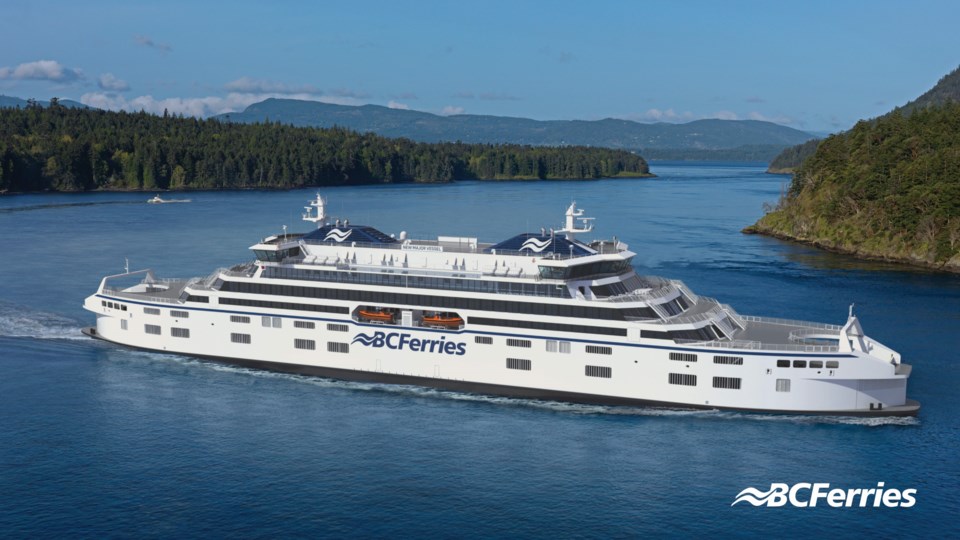Canadian shipbuilders simply can’t compete with lower cost jurisdictions like Poland, which is why it’s unlikely BC Ferries will ever see ferries built in B.C, according to Seaspan.
Just last week, BC Ferries announced its request for proposals to pre-qualified shipyards for its new major vessel (NMV) program. BC Ferries is seeking to have five new ferries built, and plans to award the contract to build them in the spring of 2025, with the first vessel to enter service in 2029.
But B.C.’s biggest shipbuilder -- Seaspan Shipyards -- swiftly rejected the notion that the vessels could be built at a domestic shipyard.
In a press release headlined BC Ferries will not be built in BC, Seaspan says it simply can’t compete with shipbuilders in countries that are more cost competitive.
“Seaspan has assessed the competition for the BC Ferries NMV program and our conclusion is that it does not support the opportunity for the B.C. maritime sector to make a meaningful contribution to building these vessels – and thereby create high-value jobs and economic benefits for British Columbians,” the company said.
“As BC Ferries has outlined in their press release, cost is a primary issue and therefore, no bidder will be incentivized to include significant Canadian/BC domestic content in their bids.
"Canadian shipyards and their supply chains cannot compete with low wage countries that have lower employment standards, lower environmental standards and lower safety standards than Canada and BC. The most significant difference is that in B.C., the wages that we pay our skilled trades workforce are substantially higher than in those other countries.”
In recent years, contracts to refurbish or build new ferries for BC Ferries has gone to shipbuilders in Poland and Romania.
There's no question Seaspan has the capacity to build build ferries. Thanks to Canada's National Shipbuilding Strategy, Seaspan has developed its shipbuilding capacity and built up a workforce of 2,700.
Under the federal program, Seaspan has built four vessels for the Canadian Navy and Coast Guard, and will also be building a polar icebreaker for the Coast Guard.
The shipyard may have its hands full right now building ships for the federal government, but in 2028, the company expects it would have the capacity to take on ferry construction, if BC Ferries were prepared to pay the premium needed to cover the higher labour costs.
Dave Hargreaves, senior vice president of strategy, business development and communications at Seaspan Shipyards, said wages for shipbuilders in places like Poland can be half what they are in Canada.
“Portions of the program, we could be very cost competitive on, but the labour portion is much harder,” he said. “Our cost of labour in B.C. is relatively high compared to other countries, and it’s just not a competitive situation.”
The B.C. government would need to subsidize a ferry construction program if it wanted the vessels built at home, Seaspan suggests.
“Other provinces in Canada (particularly Quebec) are supporting their shipyards aggressively by requiring domestic build and providing tax credits, forgivable loans and grants well in excess of $1 billion to their shipyards," the company says in its news release.
"This contributes to a significant competitive disadvantage for BC shipyards and workers."
A subsidized ferry building program was tried in B.C. before, however, and it was a political disaster.
In the late 1990s, the Glen Clark NDP government tried to revitalize B.C.’s shipbuilding sector by requiring BC Ferries to have three new fast ferries built in B.C.
The project ended up costing $460 million -- twice the original estimated cost – was three years years behind schedule, and the boats that the program delivered were total duds. They were only in service a short time before they were removed from service and sold for $19 million.
Hargreaves said B.C.'s shipbuilding industry has come a long way since then. The National Shipbuilding Strategy has meant having to pay a premium for having the work done it Canada, but the benefit has been that it has helped foster a modern shipbuilding industry in Canada, on both east and west coasts.
“I think there is a very strong economic business case both for building those vessels in Canada, but also building BC Ferries in Canada," Hargreaves said. "When we build vessels, we obviously create a whole bunch of jobs.”




